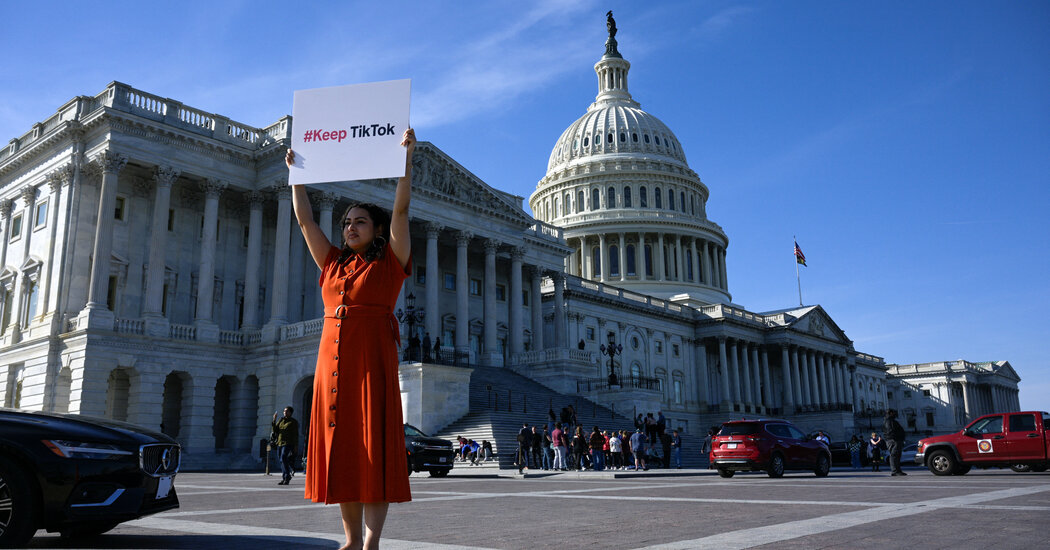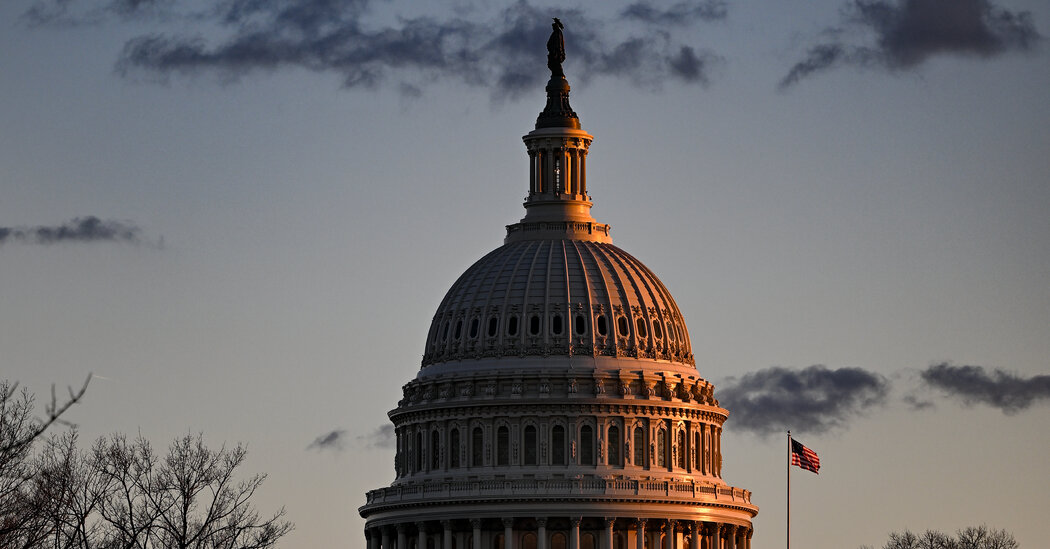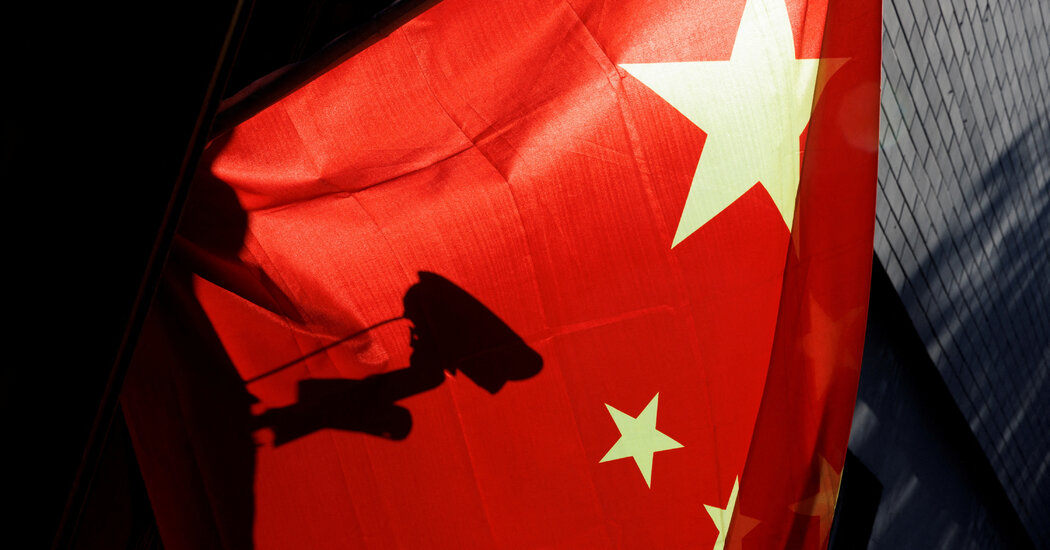In Taiwan, the government is racing to do what no country or even company has been able to: build an alternative to Starlink, the satellite internet service operated by Elon Musk’s rocket company, SpaceX. Starlink has allowed militaries, power plants and medical workers to maintain crucial online connections when primary infrastructure has failed in emergencies, such as an earthquake in Tonga and Russia’s invasion of Ukraine. Officials in Taiwan face constant reminders that its communication infrastructure must be able to withstand a crisis. The island democracy sits 80 miles from…
Tag: Computers and the Internet
TikTok Turns to Creators to Fight Possible Ban
Facing a possible ban in the United States, TikTok has scrambled to deploy perhaps its most powerful weapon: its creators. The hugely popular video service began recruiting dozens of creators at the end of last week, asking them to travel to Washington to fight a bill being debated in Congress. Under the proposal, TikTok’s Chinese owner, ByteDance, would need to sell the app or it would be blocked in the United States. Many of the creators have met with lawmakers and posted videos about their opposition to the bill with…
U.S. House Passes Bill That Could Ban TikTok
The House on Wednesday passed a bill with broad bipartisan support that would force TikTok’s Chinese owner to either sell the hugely popular video app or have it banned in the United States. The move escalates a showdown between Beijing and Washington over the control of a wide range of technologies that could affect national security, free speech and the social media industry. Republican leaders fast-tracked the bill through the House with limited debate, and it passed on a lopsided vote of 352 to 65, reflecting widespread backing for legislation…
China Condemns U.S. Proposal to Force the Sale of TikTok
China on Wednesday condemned U.S. lawmakers’ push to force the Chinese parent company of TikTok to sell the popular short video platform. In Washington, House lawmakers were expected to vote on a bill later in the day that would require the Chinese internet company ByteDance to cut ties with TikTok or face a nationwide ban. Lawmakers say that Beijing could use TikTok to spread Chinese Communist Party messages or gain access to sensitive data about TikTok’s American users. Beijing rejected concerns that the app was a danger to the United…
What to Know About the TikTok Ban Legislation
House lawmakers are expected to vote starting at around 10 a.m. on Wednesday on legislation meant to force ByteDance, the Chinese internet company, to sell its wildly popular social media app TikTok. The vote would be the latest development in a yearslong cold war between the United States and China over who controls valuable technology from computer chips to artificial intelligence. Lawmakers and the White House have expressed concerns that TikTok’s Chinese ownership poses a national security risk because Beijing could use the app to gain access to Americans’ data…
Big American Tech Profits From Chinese Ad Spending Spree
The trade relationship between China and the United States has plenty of friction. But at least one area is booming: Chinese start-ups looking to establish a presence in the West are spending billions of dollars for advertisements on services owned by some of Silicon Valley’s biggest technology companies. Temu, the international arm of the Chinese e-commerce giant Pinduoduo, is flooding Google with ads for absurdly inexpensive goods. With an initial public offering looming, the fast-fashion merchant Shein is inundating Instagram with ads for clothes and accessories at rock-bottom prices. Developers…
Biden Calls Chinese Electric Vehicles a Security Threat
President Biden took steps on Thursday toward blocking internet-connected Chinese cars and trucks from entry to the American auto market, including electric vehicles, saying they posed risks to national security because their operating systems could send sensitive information to Beijing. The immediate action was the opening of a Commerce Department investigation into security threats, which could lead to new regulations or restrictions on Chinese vehicles. But administration officials made clear it was the first step in what could be a wide range of policy responses meant to stop low-cost Chinese…
Biden Issues Executive Order to Restrict Personal Data Sales to China and Russia
President Biden issued an executive order Wednesday seeking to restrict the sale of sensitive American data to China, Russia and four more countries, a first-of-its-kind attempt to keep personally identifying information from being obtained for blackmail, scams or other harm. The president asked the Justice Department to write rules restricting the sale of information about Americans’ locations, health and genetics to China, Russia, Iran, North Korea, Cuba and Venezuela, as well as any entities linked to those countries. The restrictions would also cover financial information, biometric data and other types…
As China Expands Its Hacking Operations, a Vulnerability Emerges
The Chinese hacking tools made public in recent days illustrate how much Beijing has expanded the reach of its computer infiltration campaigns through the use of a network of contractors, as well as the vulnerabilities of its emerging system. The new revelations underscore the degree to which China has ignored, or evaded, American efforts for more than a decade to curb its extensive hacking operations. Instead, China has both built the cyberoperations of its intelligence services and developed a spider web of independent companies to do the work. Last weekend…
Leaked Files Show the Secret World of China’s Hackers for Hire
A cache of documents from a Chinese security firm working for Chinese government agencies showed an extensive effort to hack many foreign governments and telecommunications firms, particularly in Asia, as well as targets of the country’s domestic surveillance apparatus. The documents, which were posted to a public website last week, revealed an eight-year effort to target databases and tap communications in South Korea, Taiwan, Hong Kong, Malaysia, India and elsewhere in Asia. The files also revealed a campaign to monitor closely the activities of ethnic minorities in China and online…









